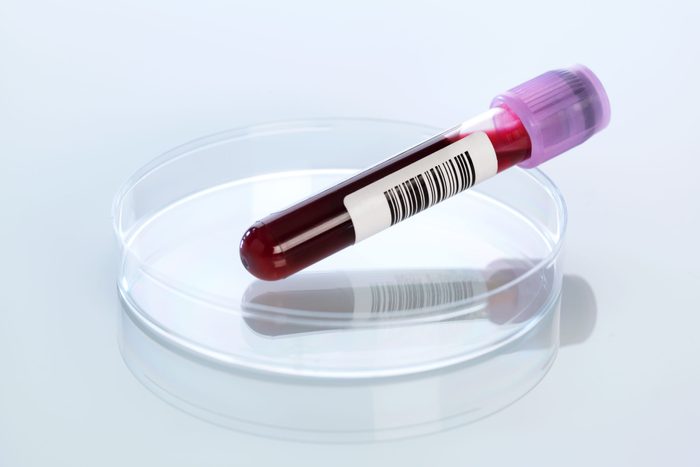This Simple New Blood Test Can Detect Alzheimer’s Risk with 96% Accuracy
Updated: Apr. 11, 2023

Alzheimer's disease often begins a decade before you show symptoms. "Ideally, we'd like people to be screened for Alzheimer's disease annually, just like they do for heart disease and cancer," says a cell biologist who helped develop this new Alzheimer's blood test.
Here’s a statistic to make you think: The lifetime risk for Alzheimer’s disease at age 45 is one in five for women, and one in 10 for men, according to the Alzheimer’s Association (which describes itself as “the leading voluntary health organization in Alzheimer’s care, support and research”). With nearly seven million Americans already experiencing Alzheimer’s and countless loved ones also feeling the effects, this information can daunting. “Alzheimer’s is a very insidious disease—it starts damaging the brain 10 years before patients notice symptoms and by that point, the damage is significant and irreversible,” explains Cassandra DeMarshall, PhD, a cell and molecular biologist who specializes in neurodegenerative diseases and the Director of Research at Durin Technologies Inc., the manufacturer of the test. “This can have a huge impact on patients and their families, yet we didn’t have an easy and reliable way to screen for it.”
But what if there were a way to know not only your risk of developing Alzheimer’s, but whether you’ve actually got the disease—years before you start to see symptoms…and in time to start treating it early?
A new blood test for Alzheimer’s disease can detect the disease in its very earliest stage and is 96% accurate, according to data published in April 2023 in the Journal of Alzheimer’s Disease.
“Now,” says Dr. DeMarshall, “with a simple blood draw, patients can screen for Alzheimer’s disease, allowing them to make better, more informed decisions about their health and starting treatment early, when it’s most effective.”
Here’s One Reason Why Women May Have a Higher Alzheimer’s Risk Than Men
How the Alzheimer’s blood test works
When an illness, like Alzheimer’s disease, attacks your body, it causes “debris” which is then released into your blood. Your body responds to the debris by releasing “autoantibodies,” a self-reactive type of antibody that targets your body’s own proteins. These autoantibodies are released in a predictable way that creates a profile of the specific disease causing the damage.
Dr. DeMarshall and her fellow researchers found a way to identify the unique autoantibody profile for Alzheimer’s disease in the blood, allowing them to detect it long before symptoms start.
Bonus: She says that their research doesn’t just apply to Alzheimer’s disease but could be used to identify the unique autoantibody profile of many other serious illnesses, including Parkinson’s disease, ALS, schizophrenia, and even breast cancer.
15 Things No One Tells You About Alzheimer’s Disease
When should you get tested for Alzheimer’s disease?
Most Alzheimer’s patients are diagnosed after age 65, but many researchers now believe the disease begins in the late forties to early fifties. “Ideally, we’d like people to be screened for Alzheimer’s disease annually, just like they do for heart disease and cancer, starting around age 50,” says DeMarshall.
10 Early Signs of Alzheimer’s Every Adult Should Know
Why get tested for Alzheimer’s if there is no cure?
At the heart of the conversation about Alzheimer’s disease testing is the painful fact that there is no cure yet for the disease. While there are some treatments that can help slow the progression of the illness, it is 100% fatal. In fact, Alzheimer’s disease is currently ranked as the seventh-leading cause of death in the United States. So if it’s progressive and you can’t cure it…do you really want to know if you have it?
This is a question Dr. DeMarshall says she hears often. Her answer is a definitive yes. “Early disease detection is a game changer for Alzheimer’s patients,” she says. “You can start treatments and lifestyle changes early, when they can have the greatest impact in slowing the disease progression.”
She adds that there are also some very promising clinical trials of Alzheimer’s treatments happening that you may qualify for. Plus, having that knowledge early can help you make smarter decisions about your healthcare and plan for your future.
4 New Breakthroughs in Alzheimer’s Research with Unprecedented Results, According to Doctors
When can you get the new Alzheimer’s blood test?
This is clearly the next natural question. Dr. DeMarshall told us that she and her team have submitted the test for approval, but it hasn’t been approved just yet. For now, this means there’s not a clearly anticipated timeframe for when it will be available to the public.
The good news is that when the new Alzheimer’s blood test hopefully is approved, there aren’t specific criteria for who can or should have it. Her team’s vision is that everyone will be screened for Alzheimer’s disease starting in their fifties.
A representative told us: “At this point, Durin Technologies, Inc. is planning to have the test available [in early] 2024 and it would be administered by prescription only.”
How to protect your brain from Alzheimer’s disease, like a brain researcher
Regardless of whether you know you have it or not, there are things you can do today to reduce your risk of getting Alzheimer’s disease and to slow the progression if you do have it, says Dr. DeMarshall. “Anything that’s good for your heart is good for your brain, so we always recommend things like getting daily exercise and eating a nutritious diet,” she says.
What does that look like for her? “I take a 45-minute walk with my family every day after dinner,” she says. “Being outdoors, being with family, and moving your body are some of the best things you can do for your brain.”
Get The Healthy @Reader’s Digest newsletter for wellness wisdom in your inbox daily. Follow us on Facebook and Instagram, and keep reading:



















